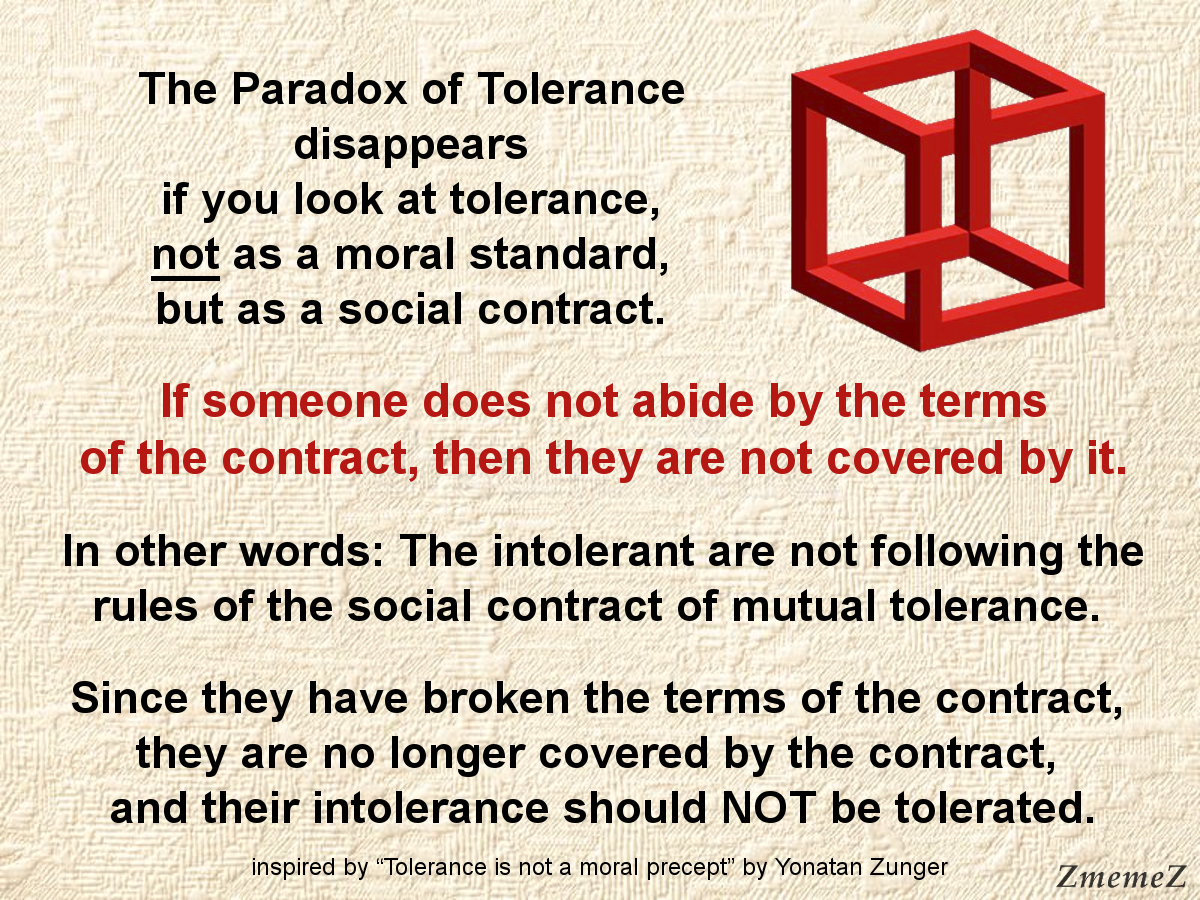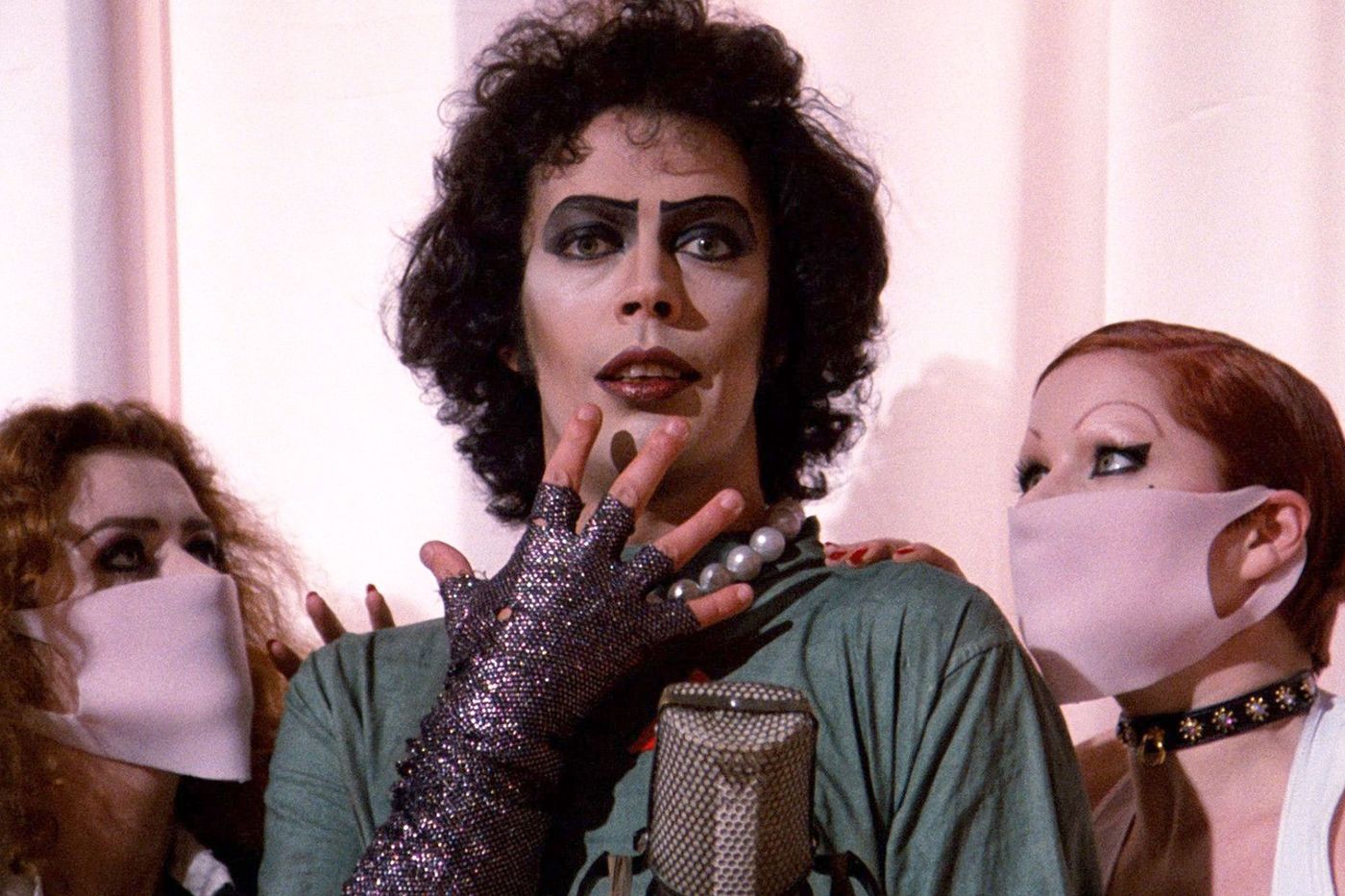This is what I’ve always said to people when it comes to things like respect
Respect isn’t earned it’s the baseline. You give everyone a base level of respect as the default and their reaction is what determines your continued level of respect.
It goes way, way deeper.
It’s the tit-for-tat strategy that is applicable in a very wide range of situations. And animals follow it too. It is deeply ingrained in our biology.
-
first time you interact with a new person, you assume they are following the same strategy, so you cooperate.
-
if they don’t, then next time, you don’t either. But if they do, then you both continue cooperating until someone breaks the chain of trust.
-
Once broken, the guilty party must make amends to restart.
-
If broken, but neither party acknowledges guilt, a restart can be tried, but it will always be difficult due to distrust. So it works better if one party takes the blame, makes amends and restarts. (this is called ‘being the bigger person’).
Upvote for mentioning tit-for-tat. There has been a lot of research on the iterated prisoner’s dilemma, and as I recall the winning strategy determined by many experiments showed that over time, the ‘nice tit-for-tat’ strategy gets the highest score. It may lose out in an individual interaction, but over time, sticking to it is the best long-term strategy.
However this does mean if one is a grifter and fully expects never to interact with the other (victim) party again… there’s less incentive to use such a strategy.
Indeed.
Which is why most people have an innate distrust and disgust of grifters.
I would even argue that our very deep disgust against grifters is the legitimate base emotion on which xenophobia is built and therefore xenophobia will always be with us and must always be actively unlearned.
(Racism, in contrast, is learned and can be eradicated by stopping it’s spread)
-
Word “respect” means two different things. One of them can only be earned, another can only be given.
What’s more, the part that can only be given is best described by trust. As in, the only way you can truly know if you can trust someone is to trust and find out.
In this context, the respect that is given - a regard for the others - is a baseline trust in a reciprocal valuation. The respect that is earned is the collection of outcomes that feed into others’ trust risk assessment.
I’d argue that dignity is the baseline but that respect is subjective.
Well said! Good reminder for why we punch fascists.
good point, but not a meme
Please post stuff like this in !actualsocialism@lemmy.dbzer0.com from now on
Not giving a shit about other people is a mental illness. Lack of empathy may be taught by several institutions, but it’s still morally wrong and against human nature. Cooperation is how our species survived.
At first, I saw this and thought I really needed my glasses, but once I got them… saw this image is heavily compressed. 🥴

Thanks, edited the post with the higher resolution image
No problem, always glad to help 👍
everyone who voted for Trump broke the social contract of this country
Thank you for demonstrating exactly how this sentiment is so much of a problem.
Every marginalized populace has been accused of being an enemy of society. The paradox of intolerance says it is morally acceptable to oppress the enemies of society. The paradox says that oppressing these enemies is a moral imperative.
The same moral principle that allows you to be intolerant of Trump voters justifies intolerance toward Biden voters, and anyone else that anyone doesn’t like.
The paradox of intolerance was cribbed from Mein Kampf, and is the foundational principle of fascism.
On today’s episode of “the real fascists are the fascists who won’t let me fascist.”
I’m gonna need a source on that, bud.
I gave you the source. Mein Kampf.
Hitler regularly spoke about the “harm” he believed Judaism was causing. He infamously demonstrated his belief that the Jewish mindset was dangerously harmful to society, and used that risk and danger to justify acting against them. His argument was that Judaism was “intolerant” of German culture, and he came to the same conclusion that Popper would come to a little later: it is morally correct to suppress the “intolerant”.
The correct lesson to learn from Popper’s Paradox is the insidiousness of fascism. Intolerance for the “intolerant” is the foundation.
It’s different because the Jews weren’t fascists.
I dunno man, Israel serving some real fashy vibes rn.
If a philosophical model leads to atrocity when it is adopted by your enemy, that model is irreparably flawed.
The moral lesson from the Intolerance paradox is “you are justified in destroying those who do not agree with you”. That philosophy is identical to and indistinguishable from the personal worldview of every oppressor that has ever existed.
Whether the Jews were actually, objectively fascist or not is irrelevant: the German public believed them to be their enemies, and believed themselves justified in destroying their enemies. Popper’s Paradox does not improve that situation; it worsens it. It gives them a sense of legitimacy for whatever actions they decide to take against their enemy.
No, the moral lesson from the intolerance paradox is “destroy intolerance”.
Bad people always find excuses. Do you believe in feeding the homeless? What if the Nazis fed the homeless Jews Zyklon B, would you still believe in feeding the homeless then, you genocidal freak?
You’re not quite grasping the concept.
The entire point of Popper’s Paradox is to encourage “Good” people to use the exact same excuses as the “Bad”.
The problem with the paradox is that nobody identifies themselves as the bad guy.
You have demonstrated hostility toward me, intolerance of my viewpoint. My philosophy of “tolerance” calls for me to tolerate your speech, up until you actually call for harm against me. Your philosophy of “intolerance for the intolerant” calls for me to suppress you.
Adopting your philosophical model, I should hunt you down and destroy you. Maintaining my own philosophical model, I should endeavor to tolerate your intolerant attitude and behavior.
Shall I maintain my own philosophy? Or shall I adopt yours?
I think you meant to say “Trump bad!!!”
The downvotes you have received are ridiculous. Despite the well spoken argument that you have made in good faith, people are just pissed off that you’ve seen the problem in a different way to them and I’d guess that in many cases, just failed to understand what you’re saying.
I think you’re absolutely right. Alienating people politically opposed to you by insulting them, isn’t only a reciprocating problem, but actively counter productive to your cause. I don’t think any republican has switched sides because a democrat has called them a low IQ cult member.
This is some Reddit tier shit. Such a shame.
You’re right, it all depends on who is in power, and what they define to be tolerable and what intolerance is in their view. That’s why it’s our moral obligation to tolerate the intolerant, however counterintuitive that may sound.
There is a line, but that line is where intolerant speech crosses to threats or acts of physical harm, either to person or property.
“If you offend me, I will silence you.”
Vs.
“I don’t agree with what you say, but I will defend to my death your right to say it.”
Not a fan of Trump, but there was never a “social contract” in the first place.
if you think that, you are not a citizen… you’re a customer…
I’m a citizen by coercion of the government, not by voluntary means.
A “social contract” cannot be used to justify the existence of an oligarchy of politicians and its actions because they will initiate force against those who do not wish to enter into that contract.
In fact, the so-called “social contract” is not a contract at all because it is unilateral in nature. Voting and taxation don’t necessarily imply consent with how government works, as there is no explicit consent of every citizen.
Such indiscriminate uncritical love of representative democracy is a threat to liberty itself.
you sound like a Russian propagandist… only someone totally defeated by fear thinks that way… you are clearly a slave…
Argumentum ad hominem.
you’re mis-using that term, to try to gain sympathy… another sign of weakness…
Sorry, dude, but your previous comment was a textbook example of ad hominem. Further, the comment I’m replying to is an example of gaslighting and another ad hom.
Focus on the argument, not the person making it.
You’re literally accusing me of “russian propagandist” instead of replying to my personal argument.
The paradox has never been a problem. This is just another way to frame it
It’s like saying ‘you might think this engine is broken since it can’t run on the water that it is filled with, but if you simply remove the water and replace it with petrol suddenly the engine is fixed.’
The post seems to approach the paradox as if it meant to show that tolerance is inherently broken when in reality it just points out the possibility of problematic aspects if incorrectly applied, like in the above where it is obvious the engine itself was never broken. The paradox doesn’t disappear, it simply doesn’t apply to that particular application.
The main idea from OPs post is often ascribed to Yonatan Zunger as some huge revelation, but really this idea has been about for quite some time as its not exactly hard to come up with. For example, K. R. Popper 1945, and E. M. Forster 1922 both wrote about this.
The paradox has never been a problem for you.
Some people find the paradox of tolerance to be unhelpful because it seems like it’s making an excuse for intolerance. And to be fair, the paradox phrasing doesn’t provide hard boundaries - intentionally, I think, since the extent to which a statement is intolerant can vary - and intolerance in response to it should be commensurate. But for people who tend towards black and white thinking, it can be a problematic explanation.
The social contact version is much more clear cut: the metaphor of contract law is binary, and contains the image of the neutral “judge” which is helpful for black and white thinkers. A person either is it is not in breach of contract. It lacks nuance, which is good and bad.
Essentially, the core idea is the same: tolerance is the expected foundation; intolerance is abnormal and not ok. But whichever expression works for you is probably better.
Editing to add: the contract version, with its appeal to the Law and judges etc, is objective, which is helpful; the subjective nature of the paradox means that it can be weaponized - and it is, often. Tho to be fair the people who would weaponize it would probably weaponize either version - as it has been, multiple times in this very thread.
For me? Yeah sure, but that’s irrelevant and not the case of my comment.
What I meant is that the paradox doesn’t mean that the concept of tolerance is toppled by the paradox existing.
But your exploration of the topic is spot-on. This post is an additional way to describe it and it seems to be more approachable to many, so great
Right this is just adding another layer to the same concept.
Adding, and then insisting upon, the existence of a social construct, doesn’t negate the existence of the original paradox.
Of course if we all agree to play by the same rules, those rules make more sense. That’s kinda the point.
The paradox is about what happens if some people refuse to accept those rules. Then it all falls apart.
Whoa, if someone doesn’t abide by a social contract, it doesn’t apply to them? That is legitimately a scary thought. It feels a bit like saying if I break a law, the law doesn’t apply to me; but I would very much like the parts that shield me from abuse and unfair judgement, to still apply…
Also what is the universally accepted subset of human behaviors, viewpoints and identities that we should tolerate? It seems like an arbitrary line, in some ways, and if it’s an arbitrary line, it can be moved to exclude ever more people.
Playing devils advocate here, I don’t have a problem with, say, rejecting fascists and nazis whose viewpoints are destructive toward the kind of world I wish to live in. That’s simply being pragmatic.
If you violate the terms of an agreement you do not get the benefits of the agreement but that does not mean that you cannot be punished.
Laws and social contracts are different things. A social contract is often only enforced by the option of its withdrawal. Another example is covering shifts at work. If a colleague asks you, and you always refuse, you then can’t complain when they refuse, when you ask them. The social contract is “You bail me out, and I’ll bail you out in turn.”
A lot of social contracts are implicit in our cultures. They take the form of “respect” or “courtesy”. In fact, many are good examples of “enlightened self interest altruism”. You do something altruistic, with the understanding that, if needed, others will do the same for you in the future. E.g. I support having a strong income safety net, financed by taxes (including my own). I never plan on relying on it, but support it because I hope something would catch me if I ended up in trouble. (I also support it because I consider it a good thing, but that’s only my internal feelings on the matter)
It is moral to follow the contract, but tolerance itself is not inherently moral. The contract is.
Right, need to show this to Muslims in this country I live in.
Muslims are the only intolerant people in your society? Is it all Muslims or just the diehard fan boys?
There are several pockets of area where Muslims are not the majority.
I have never heard of violence against minorities in that area, even for Muslims themselves.
Meanwhile Muslims:
-
Prevent people from eating during Ramadhan. They force minorities to fast also.
-
Destroy Churches and other religious buildings.
-
Prevent people from going to Church or Temples etc.
-
Harass Chinese, somehow Chinese are so hated around here. For no fucking reason.
Hint: this is in Southeast Asia.
Indonesia?
-
I don’t know why I am so helpless to resist putting energy into things that make me so unhappy, but I am. I will mention an example to explain why I feel this is inconsistent, and then condemn the ideals behind the paradox.
By no means was India under a social contract with the colonialist British Raj. The British Raj was created using forceful means.
India did not gain swaraj by professing violence when the British intimidated them. Nor when they British rode over them on horses. They gained swaraj through non-violent resistance. The successful party tolerated outrageous abuse without violence. And won their social contract.
The Paradox of Tolerance suggests the only means of combating violent intolerance is through the same intolerance.
I cannot agree. This is no different from saying, “A violent dog may only be stopped by a violent dog.” The people who follow such dogma devolve into organizations such as Hamas. Hamas is right to resist their intolerant neighbors. Certainly. Absolutely? Even through violence against civilians?
One sentiment in this thread cut close to this issue, which I will paraphrase. “Anyone who passively supports intolerance is also intolerant.”
Such an ideal supports violence, as each side believes they are justified in causing ever higher counts of casualties, “To remove the intolerant.”
Violence for violence. Hate for hate. There is no end to intolerance, ever. Not through tolerance, not through discourse, not through genocide of the intolerant.
The end of a violent dog is through careful restraint and gentle care, but there will always be violent dogs. Violence is a short term dirty bandage, followed by rot, followed by excision. Only care can help heal a wound.
The paradox is almost right. The end to tolerance is… intolerance.
Forgive me for intruding upon your morning, I wish you a pleasant day.
I’m glad you put the effort in, it’s the only way humanity can improve upon itself.
I agree with what you’ve said and think this graphic agrees with you as well. I don’t believe it implies that violence should be used against the intolerant but rather that action should be taken to remedy intolerance.
However I do see what you mean, as it’s phrasing doesn’t preclude violence either and could be further refined to highlight that point.
deleted by creator
https://www.youtube.com/watch?v=BiqDZlAZygU rowan atkison on the paradox of tolerance.
This is delivered in an entertaining way, but it has multiple issues within.
For one, it’s delivered by a “beloved” UK institution of an entertainer, who has power and a podium. Insulting him as he asks would be largely pointless. It’s not a level playing field.
He also utilises a number of straw men arguments throughout, without citation, so a decent chunk can be ignored as he’s arguing against a fictitious stance he’s created for comedic effect.
Also, there’s a suggestion that an insult doesn’t carry weight, impact or importance. Which isn’t true. Again, insulting him would largely achieve very little, but that’s really not the case for most people, especially those who are already struggling in society.
Allowing any arbitrary insult, especially in the widely visible and indefinitely indelible world of the internet, can have long, deep and destructive implications on those on the receiving end of them.
Words have power, those who lie, deceive or misconstrue facts should be held to account for it.
As Pratchett said, a lie can travel around the world before the truth can get it’s boots on.
Gute reminder due why we eat the rich.













